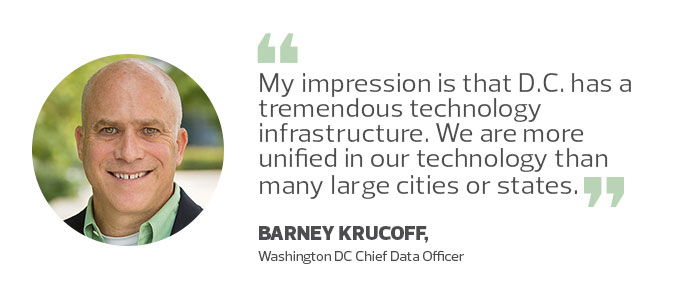Q&A: Chief Data Officer Barney Krucoff Drives Washington, D.C.’s Data Strategy
Smart cities can’t be smart without data to fuel them. That’s why more cities, like Boston and now Washington, D.C., are adding chief data officers to their technology leadership.
As the nation’s capital, the District of Columbia is a unique entity: It is managed on some levels by Congress, while acting in some ways as a state and county government in addition to its primary role as a city government.
We spoke recently with Barney Krucoff, who was named the city’s first chief data officer in August (after serving as a geographic information officer in neighboring Maryland and in the District), to get a better understanding of his vision for the city’s use of data and technology.
STATETECH: What do you hope to achieve in your role as chief data officer for D.C.?
KRUCOFF: I want to increase the velocity of data around the city, get it to people who need it, including the public, and lower the cost of transactions to move the data around. Our government transactions are expensive. The more we can have set systems, both policywise and technologywise, and move the data around appropriately, not underscoring or oversharing, then we can save ourselves a lot of money and get the value out of the information.
STATETECH: What will the relationship be like between you and the city’s chief technology officer, Archana Vemulapalli?
KRUCOFF: I’m in the technology department, which in D.C. is called the Office of the Chief Technology Officer. But I have a reasonable scope within the department. I’m essentially a deputy-level employee in the department. I have management and budget authority over three programs right now: the GIS program; the business intelligence program; and the citywide data warehouse, which is a longstanding program.
I also have a dotted line into middleware, like service-oriented architecture teams and application gateway folks. We’ve got a ton of tools in the city and a ton of people. My job is to make it a more coherent mix.
STATETECH: How is the city prepared, from an IT infrastructure perspective, to support the work you’ll be doing?
KRUCOFF: My impression is that D.C. has a tremendous technology infrastructure. We are more unified in our technology than many large cities or states. There’s a city-owned network backbone that connects us all, and there’s a centralized security team, so not everybody’s got their own firewall group and you’re not necessarily negotiating that across multiple agencies. The IT department is fairly operational, not just a policy shop. We run all the email, we run many applications, we run the centralized web team.
So there’s a lot of infrastructure in D.C., and there’s a reasonable amount of resources for the amount of government we have. We weren’t necessarily as efficient as we’d like to be, and I think that’s part of my job, to try to align these pieces.

STATETECH: What database technology are you using?
KRUCOFF: You name it, we probably use it. We’re a big Oracle shop. Most of our enterprise applications — our citywide human resources system, our citywide procurement system, many of the financial systems — are Oracle. There’s still some mainframe applications here. The central register checkbook of the city is a green-screen system in the back end. There’s also, as you’d expect, plenty of SQL Server around. There are also now lots of Software as a Service vendors; 311 is a big Salesforce implementation. So there’s everything and the above in our stack of technology. My job is more about how we move between these systems than about trying to build one system to run them all.
STATETECH: Does D.C.’s unique constitution as a district and not a state present any challenges in your work in terms of gathering and analyzing data?
KRUCOFF: We’re a pretty small territory: 64 square miles. We are a state, county and city government, all rolled into one, so it’s complicated. Recently I met with an agency called DCRA, a regulatory agency for permits and land use. They make sure that your building plan conforms to zoning before they issue a building permit. That’s a totally local government function. In Maryland, I would never have met with that agency. Next, I’m going to meet with the Office of State Superintendent for Education, a state-level agency that manages all of the schools in the city — not just the public schools, but also the private schools and the charter schools.
So we have a very diverse set of things here, but we’re also all part of the same government. It’s not like when I worked for a state, and you had to round up every county in the state. Here, we have a real chance to do enterprise IT. We have an enterprise-scale government, even if it’s not the biggest geographic footprint. It’s a cool place to work for that reason.
STATETECH: What’s the first project that you’re digging into as you settle into your new role?
KRUCOFF: My first project is a data policy for the city, to look at how we classify data, how we inventory data and how we protect certain classes of data, what data should be public, what data should not be public. It’s a pretty long, detailed policy. It may be too long and too detailed — I’m having to edit it and collect comments from numerous stakeholders and try to reconcile those, but getting that policy in place is really the foundation.









